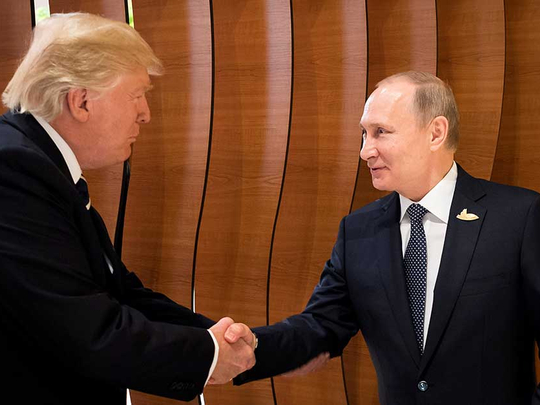
Washington: US President Donald Trump reluctantly signed off on new sanctions against Russia Wednesday, bowing to domestic pressure and putting efforts to improve ties with the Kremlin in peril.
Trump signed the legislation behind closed doors, after failed White House efforts to scupper or water down the bill.
Trump’s reluctance was on full display in an angry signing statement, in which he called the legislation “significantly flawed.”
“In its haste to pass this legislation, the Congress included a number of clearly unconstitutional provisions,” he said, including curbs on the president’s ability to “negotiate” with Russia.
“I built a truly great company worth many billions of dollars. That is a big part of the reason I was elected. As president, I can make far better deals with foreign countries than Congress,” Trump claimed.
The legislation — which also includes measures against North Korea and Iran — targets the Russian energy sector, giving Washington the ability to sanction companies involved in developing Russian pipelines, and placing curbs on some Russian weapons exporters.
It also notably constrains Trump’s ability to waive the penalties, a statement of mistrust from the Republican-controlled Congress, which remains unsettled by Trump’s warm words for President Vladimir Putin.
“The framers of our constitution made the Congress and the President coequal branches of government. This bill has already proven the wisdom of that choice,” said Senator John McCain in a biting statement.
“I hope the President will be as vocal about Russia’s aggressive behaviour as he was about his concerns with this legislation.”
Russia meddling
The sanctions seek to penalize the Kremlin for allegedly meddling in the 2016 US presidential election — which Trump won — and Russia’s annexation of Crimea.
Trump said he would “honour” some of the bill’s provisions, but stopped short of saying it would be fully implemented.
The White House said only that Trump would give Congress’s “preferences” mere “careful and respectful consideration.”
“I am signing this bill for the sake of national unity. It represents the will of the American people to see Russia take steps to improve relations with the United States.”
Trump received the legislation at 1:53 pm on Friday, but waited until Wednesday to sign it.
The nearly week-long delay in signing had raised speculation that Trump might veto or try to somehow shelve the sanctions, which were approved in a 98-2 Senate vote.
By signing it, he avoided the humiliating prospect of Congress overriding his veto.
Expecting the signature, Moscow pre-emptively ordered Washington to reduce its diplomatic presence in Russia to 455 people before September 1 — bringing it in line with the size of Russia’s mission in the United States.
The Kremlin said Wednesday that Trump signing the sanctions “doesn’t change anything,” but Russia’s prime minister Dmitry Medvedev and the foreign ministry took a more adversarial view.
Medvedev weighed in on his Facebook page, saying the sanctions had “ended Russian hopes for an improvement in relations with the new US administration.”
In a statement, the foreign ministry said the sanctions against Russia had put global stability at risk, calling them a “dangerous” and “short-sighted” policy.
“We have already shown that we are not going to leave hostile acts unanswered... and we obviously reserve the right to take retaliatory measures,” it said.
US Secretary of State Rex Tillerson said Tuesday he will meet with his Russian counterpart Foreign Minister Sergei Lavrov over the weekend, but warned US-Russia ties could still get worse.
“The question, I think, of the events of the last week or so, is it getting worse or can we maintain some level of stability in that relationship?” Tillerson asked.
Tillerson said the US Congress’s decision to pass the sanctions bill had made attempts to thaw ties “more difficult.”
A special prosecutor is investigating whether Trump advisers colluded with what US intelligence has concluded was an attempt by Russia to covertly support the real estate mogul’s 2016 campaign.
The US president, who often called for warmer ties with Moscow during the White House race, has furiously denied the charge.












